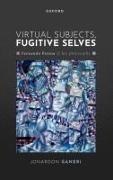Read more
This book explores the philosophical themes of self and subjectivity in the work of the Portuguese writer Fernando Pessoa, who is best known for the uncategorizable collection of fragmentary writings, in various personae, that were posthumously published as
The Book of Disquiet in 1982.
List of contents
- Preamble
- I. Pessoa Presented
- 1: Pessoa's novel invention
- 2: Heteronyms as virtual subjects
- 3: The enigma of heteronymy
- 4: The multiplicity of I
- II. Pessoa Paraphrased
- 5: The grammar of subjectivity
- 6: Being at the centre
- 7: The fugitive and the forum
- 8: Landscapes of presence
- 9: Virtual subjects
- 10: Orthonyms as shadow selves
- 11: The reality of subjects
- III. Pessoa Provoked
- 12: Uncentred minds
- 13: Centres without sensibility
- 14: Dreams inside dreams
- 15: Building subjects
- 16: The cosmos and I
- Postscript
- Bibliography
- Index
About the author
Jonardon Ganeri is a philosopher whose work draws on a variety of philosophical traditions to construct new positions in the philosophy of mind, metaphysics, and epistemology. He is the author of
Fernando Pessoa: Imagination and the Self;
Attention, Not Self;
The Concealed Art of the Soul; and
The Lost Age of Reason; all published by Oxford University Press. Ganeri joined the Fellowship of the British Academy in 2015 and won the Infosys Prize in the Humanities the same year, the only philosopher to do so. He delivered the 2024 John Locke Lectures. Ganeri is currently Bimal K. Matilal Distinguished Professor of Philosophy at the University of Toronto.
Summary
This book explores the philosophical themes of self and subjectivity in the work of the Portuguese writer Fernando Pessoa, who is best known for the uncategorizable collection of fragmentary writings, in various personae, that were posthumously published as The Book of Disquiet in 1982.
Additional text
This monograph is a deep philosophical excavation and celebration of an
extraordinary poet of modernity. The reader follows a creative philosophical conversation and encounter between the philosopher Ganeri and his own work, and the virtual subjects and fugitive selves that make up Pessoa's heteronymy and philosophy of the self.

